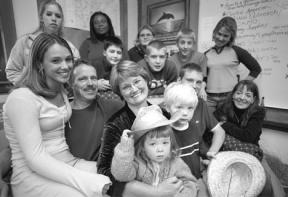From an early age Susie Richards felt the support and caring of the South Whidbey community and learned to use what she calls the “swinging doors” of giving out into the community and then receiving back. While some call her a saint for all her tireless activities in support of youth and community projects, Richards says she has received far more in return than she’s given. As a Langley Middle School teacher, most of her current activities involve helping island youth experience the power of their own community connections.
When she was younger, Richards had to first learn about community by experiencing the support and caring of others. This was her first step through the swinging doors of personal connections to society.
“I remember clearly the very first time I felt connected,” she said. “I was 5 years old, clam digging with my mother at Mutiny Bay beach, when my mom suffered a stroke and collapsed on the sand. Immediately neighbors surrounded us with there help. I felt like I was suddenly part of a much bigger family. This was my first conscious understanding of what it means to belong to a community.”
Richards’ family life was not without hardships. Her mother suffered poor health, not only from her stroke, but alcoholism as well. In addition, her older brother and sister both developed serious drug addictions. Once, when Richards was 13 years old, she remembers her brother having one of his violent outbreaks as a result of using methamphetamines. The police were called to the family’s home.
“The officer walked in and said, ‘You people asked for this,’” she recalls. “This comment devastated me. The next day, I shared this story with my school counselor, Mr. Boushe. He did an unexpected thing: He had the officer come to the school and apologize to me!”
Richards then realized the power adults could have in changing a young person’s life.
Later, when she had her own young children, she became intrigued with community-based teaching and learning. She volunteered at the Learning Park, a unique Whidbey preschool run by Chris and Edna Hansen.
“After several years of this, I knew I wanted to continue to teach and learn with children, in the tradition I had learned from Chris and Edna,” she said.
The next stage of this journey was when she started thinking about becoming a certified teacher.
“I was a stay-at-home mom, who subbed as a paraeducator at LMS and also as a waitress at Mike’s Place,” she said. “Greg Willis, the principal at LMS, came into the restaurant with his family, and told me what a great teacher I could become. I said ‘I can’t get a degree.’ I wouldn’t be able to do the college work — especially the math.”
She remembers Willis’ response: “Yes you can, and we’re going to help you all the way.”
Here were the swinging doors again, with someone seeing her potential and giving her encouragement at a time she didn’t have her own confidence.
Next came Chris Burt, who started the LMS Adventure Education sailing program. Adventure Education takes kids out on sailing expeditions to the San Juan Islands each year.
“He invited me to be part of the team, which helped me to push my own limits,” Richards said. “What this program can do for the confidence of the students is really exciting. Imagine the power of a shy 13-year-old being asked to take the helm of an expensive sailing vessel. Sometimes the students get scared. But the captain assures them ‘You can do this. I’m right here; you can’t fail.’”
It’s not surprising that these sailing expeditions open doors for the students.
One of the latest connections Richards has made between students and community is through the Youth and Philanthropy program at LMS, a program supported by the Glaser Foundation and Glaser trustee Bill Carlstrom. This program takes grant money from Glaser — up to $10,000 a year — and puts it in the hands of LMS students under Richards’ direction. The students create grant applications, research programs, and interview local people. Through this experience, adults involved with the program gain a new level of respect for youth, and the students feel a personal sense of belonging and community.
In summing up what she has learned from her own life experience through the swinging doors, Richards said she feels part of a larger group.
“Feeling a sense of connection is the basis of love and belonging. I believe that we nurture this connection of creating meaningful roles and responsibilities for our young people. Everyone needs to feel connected; it gives us purpose in this world. This is especially important when we are young.”



